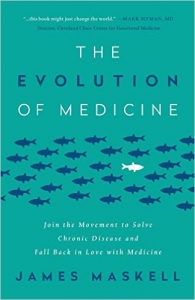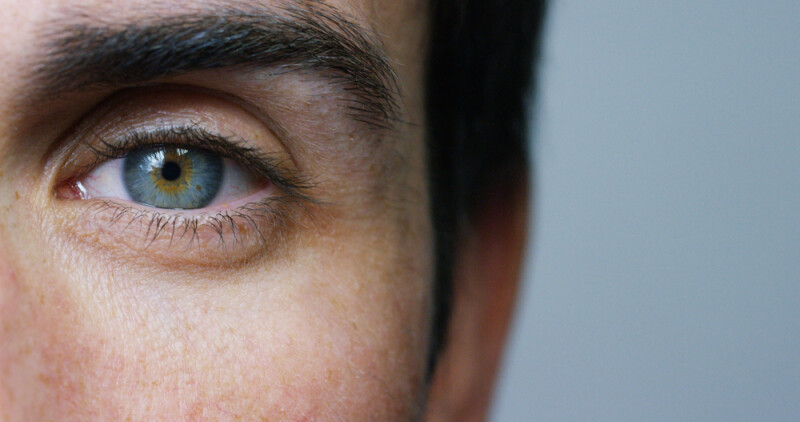Book Excerpt: The Evolution of Medicine
 Title: The Evolution of Medicine: Join the Movement to Solve Chronic Disease and Fall Back in Love with Medicine
Title: The Evolution of Medicine: Join the Movement to Solve Chronic Disease and Fall Back in Love with Medicine
Author: James Maskell
Publisher: Knew Publishing (September 16, 2016)
Ordering information: Amazon
The great paleontologist Stephen Jay Gould said that evolution proceeds, not slowly and steadily, but with long periods of little or no chance punctuated by intervals of sudden, rapid, and significant shift. If evolution is defined as adapting to one's environment, then medicine is indeed readying for this growth. The medical environment has transformed quickly over the last five decades, with the impressive gains in lifespan and communicable diseases being overshadowed by the rapid growth (and associated massive cost increases) of chronic and noncommunicable diseases (NCDs).
This is not purely an American problem, but America is certainly feeling it harder than others. As of 2016, American healthcare makes up 18.8% of GDP, and although that percentage is the highest in the world by some margin (the average is 6%), the top diagnoses in countries once considered "third word" are not what you might expect: not cholera, typhoid, or TB, but our familiar goes, type 2 diabetes, heart diseases, and cancer.
Unlike doctors, I see this issues though a lens of economics, and America's precancel of chronic disease is intimately linked to huge costs. It is estimated by some to make up as much as 80% of total healthcare costs and is scheduled to cost $47 trillion over the next decade. How high do these numbers have to go before all payers, whether they be regular people, businesses, or even sovereign nations are crushed under these enormous costs? And it's not just the cost of the "medicine." There are often associated costs, such as three full-time helpers needed for each Alzheimer's patient.
The costs of chronic disease are one piece of the puzzle, but what about the doctors themselves? For centuries, becoming a doctor has been a noble calling. Being privy to the inner-most details of their patient's lives and deepest vulnerabilities requires levels of care, compassion, and empathy that only certain people are capable of delivering ever day, over the course of their entire career.
As you probably already know, the word doctor comes from the Latin word docere, which is synonymous with teacher. I may not be a doctor myself, but I do have a General Certificate of Secondary Education in Latin (earned during a misspent youth and on the very few occasions that my Latin becomes useful I feel it necessary to show it off). The term is fitting, as early physicians were the centers of their community, not only tending to disease but also educating patients in self-care, wellness, and disease prevention. For the majority of the thousands of doctors I've met over the last decade, there was an inner calling to become a doctor, not a conscious choice. The second half of the twentieth century will surely be known in times to come as the "first golden age of medicine" with new wealth, technology, insight, and interventions elevating doctors to an almost God-like stature.
One of the side effects of this huge success was an entrenchment of hierarchy and patriarchy in medicine. The number of non-medical administrators in medicine went through the roof, often bringing with them perverse incentives and a focus away from the patient and toward the balance sheet. Male doctors wrote prescriptions and gave orders to female nurses. Younger doctors deferred to older doctors; few women or minorities were in positions of authority in medicine. Linear thinking was valued as the profession became more and more standardized, and the differentiate diagnosis reigned supreme.
These side effects went undetected for a while (as is often the case), but in the last decade an awareness has emerged, bringing with it many "symptoms." One such symptom is the number of doctors advising their own children against a career in medicine, sometimes breaking a multi-generational tradition of physician training.
The second symptom is that the level of dissatisfaction among doctors is frighteningly high. A large American physician survey in early 2016 found that 83% of doctors are disillusioned with medicine, and 63% are thinking of quitting in the next two years. But again, this problem isn't just American. Single-payer systems such as the National Health Service in the UK have similar issues, to the point of thousands of doctors going on strike in the last year and leaving medicine at unprecedented rates due to dissatisfaction with conditions, pay, and systemic issues.
Don’t miss the opportunity to hear James Maskell speak at the Integrative Healthcare Symposium Annual Conference February 23-25, 2017 in New York City. Click here for more information.




















SHARE